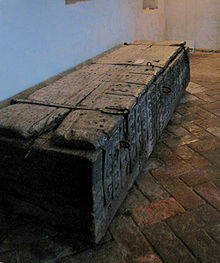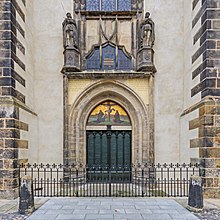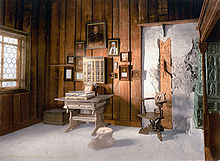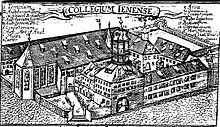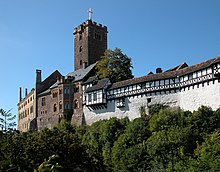History of Lutheranism
Bible Translators Theologians Lutheranism as a religious movement originated in the early 16th century Holy Roman Empire as an attempt to reform the Catholic Church.
The movement originated with the call for a public debate regarding several issues within the Catholic Church by Martin Luther, then a professor of Bible at the young University of Wittenberg.
Lutheranism soon became a wider religious and political movement within the Holy Roman Empire owing to support from key electors and the widespread adoption of the printing press.
Many religious movements prior to Martin Luther had promoted ideas that he came to adopt including the Hussites, Waldensians, and followers of Girolamo Savonarola.
New technologies came about to address labor shortages and the need to increase productivity, which in turn created new classes of society to support manufacture and trade.
The Luther family enjoyed enough income and social status that it was possible for Hans to envision a university education and career as a lawyer for his son.
He became convinced that the church was corrupt in its ways and had lost sight of what he saw as several of the central truths of Christianity, the most important of which, for Luther, was the doctrine of justification—God's act of declaring a sinner righteous—by faith alone through God's grace.
[13]Luther's writings circulated widely, reaching France, England, and Italy as early as 1519, and students thronged to Wittenberg to hear him speak.
He did not want one of his subjects to be sent to Rome to be judged by the Catholic clergy so he prevailed on the Holy Roman Emperor Charles V, who needed Frederick's support, to arrange a compromise.
On 15 June 1520, the Pope warned Luther with the papal bull (edict) Exsurge Domine that he risked excommunication unless he recanted 41 sentences drawn from his writings, including the Ninety-five Theses, within 60 days.
Johann Eck, speaking on behalf of the Empire as assistant of the Archbishop of Trier, presented Luther with copies of his writings laid out on a table, and asked him if the books were his, and whether he stood by their contents.
The Emperor presented the final draft of the Edict of Worms on May 25, 1521, declaring Luther an outlaw, banning his literature, and requiring his arrest: "We want him to be apprehended and punished as a notorious heretic".
Frederick III, Elector of Saxony had him discreetly intercepted on his way home by masked horsemen and escorted to the security of the Wartburg Castle at Eisenach, where Luther grew a beard and lived incognito for nearly eleven months, pretending to be a knight called Junker Jörg.
[20] During his stay at Wartburg (May 1521–March 1522), which he referred to as "my Patmos",[21] Luther translated the New Testament from Greek into German, and poured out doctrinal and polemical writings, including in October a renewed attack on Archbishop Albrecht of Mainz, whom he shamed into halting the sale of indulgences in his episcopates,[22] and a "Refutation of the argument of Latomus," in which he expounded the principle of justification to Jacobus Latomus, a philosopher from Louvain.
"[24] In On the Abrogation of the Private Mass, in the summer of 1521, Luther widened his target from individual pieties like indulgences and pilgrimages to doctrines at the heart of Church practices.
In Wittenberg, Andreas Karlstadt, later supported by the ex-Augustinian Gabriel Zwilling, enacted a divisive programme of reform which exceeded anything envisaged by Luther and provoked disturbances, including a revolt by the Augustinian friars against their prior, the smashing of statues and images in churches, and denunciations of the magistracy.
After secretly visiting Wittenberg in early December 1521, Luther wrote A Sincere Admonition by Martin Luther to All Christians to Guard Against Insurrection and Rebellion; but Wittenberg became more volatile after Christmas when a band of visionary zealots, the so-called Zwickau prophets, arrived preaching the equality of man, adult baptism, Christ's imminent return, and other revolutionary doctrines.
"During my absence," he wrote to the Elector, "Satan has entered my sheepfold, and committed ravages which I cannot repair by writing, but only by my personal presence and living word.
He sits with folded arms behind the fire of hell, and says with malignant looks and frightful grin: "Ah, how wise these madmen are to play my game!
The conflict would erupt into a religious war after Luther's death, fueled by the political climate of the Holy Roman Empire and strong personalities on both sides.
Although this was rejected by the Emperor, Melanchthon improved it as a private document until it was signed at a meeting of the Schmalkaldic League as the 1537 Apology of the Augsburg Confession, but the Catholic side did not respond to it until the 1545–63 Council of Trent.
In turn several Lutheran states led by Elector John Frederick I of Saxony and Landgrave Philip I of Hesse met at the town of Schmalkalden, where they established the Schmalkaldic League in 1531.
Therefore, catholic churches were redecorated when they became reformed: Paintings and statues of saints were removed and sometimes the altar table was placed in front of the pulpit, as at Strasbourg Cathedral in 1524.
"[35] The Book of Concord gave inner unity to Lutheranism, which had many controversies, mostly between Gnesio-Lutherans and Philippists, in Roman Catholic outward pressure and in alleged "crypto-Calvinistic" influence.
Late Orthodoxy was torn by influences from rationalism, philosophy based on reason, and Pietism, a revival movement in Lutheranism that sought to emphasise the importance of personal devotion, morality, emotions, and the study of Scripture.
After a century of vitality, the Pietist theologians Philipp Jakob Spener and August Hermann Francke warned that Lutheran orthodoxy degenerated life-changing scriptural truth into meaningless intellectualism and Formalism.
However, some of the laity preserved Lutheran orthodoxy from both Pietism and rationalism through reusing old catechisms, hymnbooks, postils, and devotional writings, including those written by Johann Gerhard, Heinrich Müller, and Christian Scriver.
[38] Napoleon's invasion of Germany promoted rationalism and angered German Lutherans, stirring up a desire among the people to preserve Luther's theology from the rationalist threat.
[41] Neo-Lutheran Johann Konrad Wilhelm Löhe and Old Lutheran free church leader Friedrich August Brünn[45] both sent young men overseas to serve as Pastors to German Americans, while the Inner Mission focused on renewing the situation home.
The Neo-Lutheran call to renewal failed to achieve widespread popular acceptance because it was rooted in a lofty, idealistic Romanticism that did not connect with an increasingly industrialized and secularized Europe.



